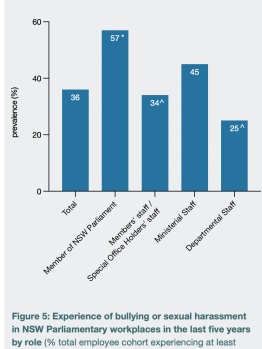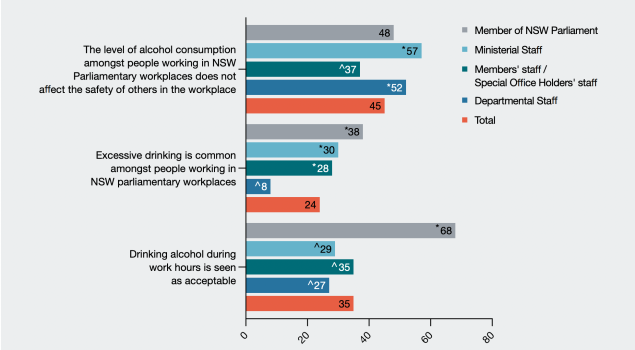Premier Dominic Perrottet hasn’t ruled out considering making the NSW parliament alcohol free after a damning report found bullying and sexual harassment is occurring at “unacceptable rates” in Macquarie Street.

The independent report by former sex discrimination commissioner Elizabeth Broderick, released last week, found unacceptable levels of sexism and sexual harassment, as well as the existence of ‘hot spots’ of bad behaviour within parliament. It identified alcohol as a key factor.
Despite expressing concerns about the drinking culture within parliament, most of the review participants believed alcohol policy should address risks and harms rather than banning it.
However, asked at a press conference about making state parliament an alcohol free zone in response to the findings, the Premier said “everything’s on the table”.
During the five year investigation 447 respondents, representing almost a third of all parliamentary workers, completed an online survey. Investigators also received 58 confidential written submissions.
The investigation found bullying is a significant issue across parliamentary workplaces and that sexual harassment and everyday sexism is occurring “at an unacceptable rate”.
High staff turnover

Overall, more than a third of workers in NSW parliamentary workplaces indicated that they had experienced some kind of bullying or sexual harassment in the last five years.
More than a quarter of workers in a NSW parliamentary workplace had experienced bullying and about a third of those had experienced it for a year or longer, indicating what the report says is a pattern of long-term, sustained behaviour.
The review also heard reports of sexual harassment and sexual assault , with two per cent of respondents alleging they’d experienced an actual or attempted sexual assault.
Some offices are described as “well-known hotspots”, characterised by high rates of staff turnover related to bad behaviour.
Departments better at handling bullying
Fifty per cent of bad behaviour came from ministers inside parliament, and MPs were more likely to experience bullying or sexual harassment in the past five years compared with members’ staff and departmental staff.
A small number of review participants reported being bullied by their managers or colleagues within parliamentary departments.
But the report said overall this group was more positive about the culture within their department, clarity around behavioural expectations and the ability to report abuses and access support.
The general perception was that the departments appear to have a more mature model for preventing and managing bullying.
Leading for Change report
“The general perception was that the departments appear to have a more mature model for preventing and managing bullying,” the report concludes.
Key drivers of harmful behaviours included
- unequal distribution of power between parliamentarians and staff
- underrepresentation of women and diverse cohorts in formal decision-making roles
- unequal distribution of accountability and inconsistent behavioural expectations
- highly pressured and political nature of the working environment
- long working hours, conditions of engagement
- access to and consumption of alcohol in NSW Parliamentary workplaces
Alcohol
Many of those surveyed commented on attitudes toward, alcohol as well as the role played by drinking culture in parliamentary workplaces.

MPs were more likely to agree that drinking alcohol during work hours was viewed as acceptable when compared with all other roles.
Many review participants believed that access to and consumption of alcohol within parliamentary workplaces was problematic and out of step with standards in other workplaces.
However, many believed that alcohol consumption was a contributing, rather than a causal factor that increased predatory behaviour and made difficult for victims to remove themselves to a safe place.
“Despite these concerns, most believed parliamentary alcohol policy should addresses the risks and harms associated with alcohol, rather than banning consumption of alcohol outright in Parliamentary workplaces,” the report notes.
Independent complaints process
The report calls for the creation of an environment where people feel safe to report bullying and harrasment, including establishing an independent complaints process to handle complaints and provide advice and early intervention.
Mr Perrottet said the report showed the culture within the NSW parliament had become toxic and described the findings as “sobering, confronting and completely unacceptable.”
“The public must have confidence in its politicians,” he told reporters.
“You can’t have confidence in its politicians in circumstances where the parliamentary environment in many instances is not free from bullying, sexual harassment and sexual assault. This must end and it ends today.”





Leave a Reply